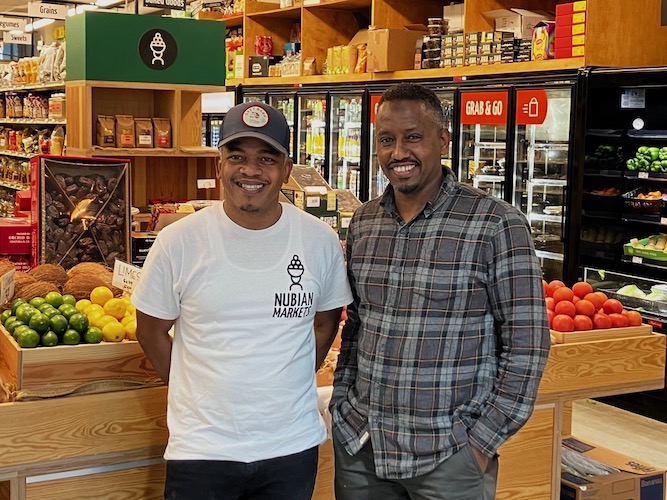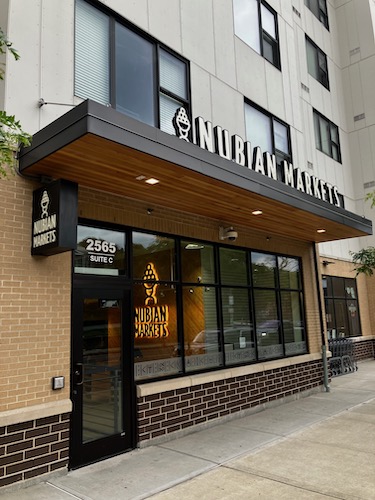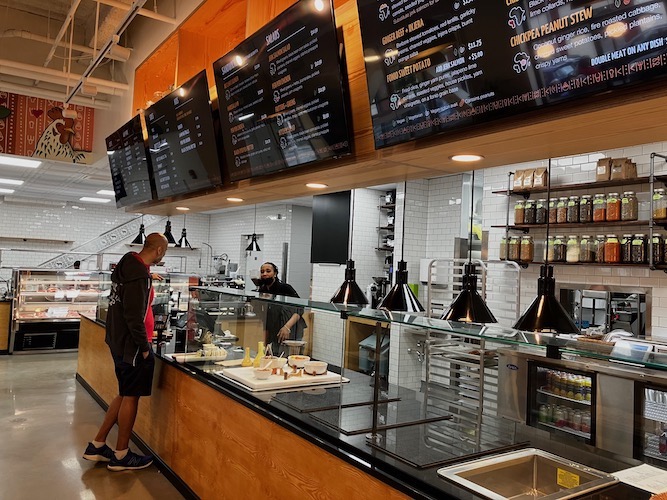The lunchtime rush in the café at Nubian Markets is over. A few patrons remain, however, peering hungrily at the overhead digital menu board. They’re offered a wealth of choices: The couscous bowl with lamb meatballs, carrot ginger couscous, and harissa stewed tomatoes. Or a chickpea peanut stew made of coconut ginger rice, fire-roasted cabbage, pickled plantains, and charred sweet potatoes. Or perhaps the neighborhood favorite: crispy chicken and hoppin’ john, consisting of black-eyed peas and rice, with sides of charred yams, jalapeno lime collards, and hot honey.
Plates heaped with aromatic vegetables in rich, tantalizing sauces, carried away by eager customers, confirm what most around here already know – almost any choice will be a tasty one.
Choice, in fact, is the operative word at Nubian Markets, a combination cafe, halal butcher, grocery store, caterer, and community space in Roxbury’s Nubian Square. Patrons can pick up a bite at the fast-casual café, and since the market’s opening in May 2023, many do. But in the store’s produce section, they can also buy fresh green beans, eggplant, or bell peppers to whip up a healthy meal at home. And when customers peruse store aisles, they find other choices not so easy to come by at other grocers. They can stock up on hard-to-find foods with cultural significance, like fonio, an ancient grain with a starring role on West African plates. They can find products sourced from Black-owned and local purveyors. And for Muslims in the neighborhood and beyond, the market offers another rare option: halal foods prepared in accordance with Islamic Law.
Until Nubian Markets opened, such a magnitude of choices in one-stop shopping in the neighborhood was virtually unheard of.
“There was no dignified shopping place for Muslims around here,” says Yusuf Yassin, general manager and co-founder alongside food entrepreneur and chef Ismail Samad. “We always felt like there was a big thing missing.”

According to its Muslim founders, Nubian Markets is a celebration of the African diaspora, the African American experience, and the Nubian Square neighborhood (formerly known as Dudley Square). Samad and Yassin’s vision is one of an affordable yet conscious and cultivated shopping experience more commonly available in whiter and wealthier neighborhoods. In their vision, a sophisticated foodie experience, with ethically sourced foods, a seasonal menu, a zero-waste kitchen, and a supper club, has been shaped within an Islamic context. At the heart of the market’s mission is broadening healthy food options in an area where they have been few and far between.
“In the Quran, there is a verse that God has created diversity in people so that people may know each other,” says Yassin. “So basically, we want this to be a gathering space for the community to share what they bring best out of their culture, out of their identity. That’s our way of contributing to the bigger community.”
“As far as the food itself and the space, it’s designed to be welcoming to everyone,” adds Samad, formerly executive chef at Daily Table and director of manufacturing operations at the food incubator CommonWealth Kitchen. “It’d be no different than saying, ‘Hey, let’s go to the neighborhood Jewish deli or to the vegan joint.'”
Reversing a Trend of Disinvestment
Nubian Markets is on the ground floor of a new building of affordable apartments in Nubian Square’s Bartlett Station. The building itself was funded in part through the Healthy Neighborhoods Equity Fund, a social investment fund created by CLF and Massachusetts Housing Investment Corporation (MHIC) dedicated to financing climate-smart affordable housing and retail developments near public transit.

When CLF and MHIC sought a local grocer to fill the building’s ground floor space, they realized that neighborhood markets and other small businesses often have a tough time making the numbers work, despite how critical they can be to residents’ health. That spurred the partners to start another investment fund, dubbed the Healthy Retail and Commerce Fund. Established in 2019, the Fund provides flexible, low-cost loans to health-promoting businesses and nonprofits in low-income communities and communities of color that often don’t qualify for bank loans or have historically been denied loans by traditional financial institutions.
The Kresge Foundation provided seed capital for Nubian Markets, and the Boston Medical Center provided a matching contribution as part of its initiative to address the root causes of poor health. Nubian Markets is one of four projects to date to benefit from a unique funding model where hospitals and health plans, alongside the Kresge Foundation, support community investments. The Local Enterprise Assistance Fund, which funds community development, also provided funding and technical assistance through the Massachusetts Food Trust program.
“Locally owned small businesses are critical building blocks in creating healthy and resilient neighborhoods,” says Virginia Foote, Director of Impact Investment at CLF. “Yusuf, Ismail, and their market are the kind of high-impact entrepreneurs and businesses we seek to support through the Healthy Retail and Commerce Fund. Not only are they experienced in the retail food sector, but they also have deep networks in Nubian Square and the local Muslim community. Supporting small entrepreneurs is a first step in reversing historical discrimination and disinvestment that continues to undermine health and wellbeing in neighborhoods of color.”
And discrimination and disinvestment have certainly played a role in Nubian Square. The neighborhood, located three miles southwest of downtown Boston, was considered the city’s “second business district” during its heyday in the first half of the 20th century. At that time, the neighborhood was primarily white. But as whites moved out, banks and insurance companies systematically denied mortgages, business loans, and insurance to Black and Brown residents steered into the community.
And because bank redlining made it impossible for small businesses to get the capital they needed to open and expand, Black and Brown entrepreneurs were denied opportunities to build wealth and grow vibrant businesses in the neighborhood.
By the 1980s, about a third of Dudley Square was scarred by vacant lots and abandoned houses. The landscape might have remained that way without the community-led redevelopment plan called the Dudley Street Neighborhood Initiative. Today, while the neighborhood still struggles with relatively high poverty, dramatic changes are afoot. Environmentally degraded land is being cleaned up. New apartments like those at Bartlett Station, many affordable, have sprung up, along with playgrounds and a community greenhouse. This shift is reflected in ventures like Nubian Markets.
Healthier Foods, A Healthier Community
Samad, who hails originally from Cleveland, and Yassin, from Eritrea, say part of the objective is to spread wealth by fortifying community strength. That means providing 14 permanent jobs on-site. Those positions are held by Black residents and Hispanic, Afghani, and Pakistani employees, among others. Their efforts to identify Black-owned products – 32 brands and 100 products to date – are also designed to build Black wealth and power. In time, Yassin and Samad hope to create a sustainable ecosystem that will flourish and proliferate into disenfranchised communities far beyond Nubian Square.

Nubian Markets is so new that its owners are still figuring out how to overcome some of the challenges they face. They are wary that the establishment may seem intimidating, with its “industrial-chic” interior featuring exposed ductwork, polished concrete floors, and plywood finishes. Too many locals, says Samad, feel like they “don’t deserve” such a space. “Our communities are excluded from receiving this type of investment,” he says.
But now’s the opportunity to turn that around. Funding from sources like CLF’s and MHIC’s Healthy Retail and Commerce Fund can be a critical tool in forging this long-standing change by helping neighborhoods reclaim their agency. The unfortunate reality of American life, says Samad, is that wealthier (often white) people can afford to eat more ethically and sustainably than lower-income (more often Black and Brown) folks. “And that’s just a function of what it means to live in an apartheid reality,” he says, speaking of the systemic racism that pervades American life.
“In business, they say don’t try and be everything to everyone. We’re breaking that rule because if we’re not, then we are ushering in the gentrification we don’t want to happen.”
Much more than meets the eye, Nubian Markets provides a model for good development, a healthy community, and sustainable food options in Roxbury and beyond. And perhaps, for the first time in a long while, for people living around Nubian Square, the choice is theirs.
